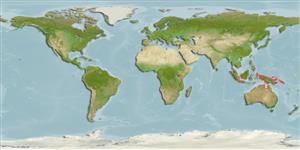Environment: milieu / climate zone / depth range / distribution range
Écologie
marin; saumâtre benthopélagique. Tropical
Western Central Pacific: New Guinea and northern Australia.
Taille / Poids / Âge
Maturity: Lm ? range ? - ? cm
Max length : 9.0 cm SL mâle / non sexé; (Ref. 9772); common length : 7.0 cm SL mâle / non sexé; (Ref. 9772)
Description synthétique
Morphologie | Morphométrie
Épines dorsales (Total): 8 - 10; Rayons mous dorsaux (Total): 25-30; Épines anales 2; Rayons mous anaux: 6 - 8. Head swollen and deep. Eye very small, 11 to 16 % of head length; snout very steeply rounded, but not swollen or projecting; mouth very large, strongly oblique; no barbel; no upper rostral pores; mental pores in one pair only, open behind symphysis; teeth well differentiated into large and small in both jaws; gill rakers long, slender, equal to or longer than gill filaments at angle, 16 to 18 on lower limb. Dorsal fin with VII to IX (most frequently VIII) spines. Second anal spine long, slender, 31 to 44 % of head length; caudal fin acutely pointed. Swim bladder hammer-shaped, with 11 pairs of arborescent appendages along its side, the first pair entering head beyond transverse septum and sending a palmate branch to the front of pectoral arch. Sagitta (large earstone) with tadpole-shaped impression, the head of which has its long axis lying obliquely to that of sagitta and the tail expanded and deepened as a hollow cone connected with the head by a narrow groove.
Inhabits estuaries and rivers (Ref. 9772).
Life cycle and mating behavior
Maturité | Reproduction | Frai | Œufs | Fécondité | Larves
Sasaki, K., 2001. Sciaenidae. Croakers (drums). p.3117-3174. In K.E. Carpenter and V.H. Niem (eds.) FAO species identification guide for fishery purposes. The living marine resources of the Western Central Pacific. Volume 5. Bony fishes part 3 (Menidae to Pomacentridae). Rome, FAO. pp. 2791-3380. (Ref. 9772)
Statut dans la liste rouge de l'IUCN (Ref. 130435)
Menace pour l'homme
Harmless
Utilisations par l'homme
Pêcheries: sans intérêt
Plus d'informations
PaysZones FAOÉcosystèmesOccurrencesIntroductionsStocksÉcologieRégime alimentaireÉléments du régime alimentaireConsommation alimentaireRation
Noms communsSynonymesMétabolismePrédateursÉcotoxicologieReproductionMaturitéFraiRassemblement de ponteFéconditéŒufsDéveloppement de l'œuf
Taille/ÂgeCroissanceLongueur-poidsLongueur-longueurFréquences de longueursMorphométrieMorphologieLarvesDynamique des populations larvairesRecrutementAbondanceBRUVS
RéférencesAquacultureProfil d'aquacultureSouchesGénétiqueElectrophoresesHéritabilitéPathologiesTraitementNutrientsMass conversion
CollaborateursImagesStamps, Coins Misc.SonsCiguateraVitesseType de nageSurface branchialeOtolithesCerveauxVision
Outils
Articles particuliers
Télécharger en XML
Sources Internet
Estimates based on models
Preferred temperature (Ref.
123201): 26.9 - 28.9, mean 28 °C (based on 294 cells).
Phylogenetic diversity index (Ref.
82804): PD
50 = 0.5000 [Uniqueness, from 0.5 = low to 2.0 = high].
Bayesian length-weight: a=0.00891 (0.00410 - 0.01937), b=3.08 (2.91 - 3.25), in cm total length, based on LWR estimates for this Genus-body shape (Ref.
93245).
Niveau trophique (Ref.
69278): 3.3 ±0.4 se; based on size and trophs of closest relatives
Résilience (Ref.
120179): Haut, temps minimum de doublement de population inférieur à 15 mois (Preliminary K or Fecundity.).
Fishing Vulnerability (Ref.
59153): Low vulnerability (10 of 100).
